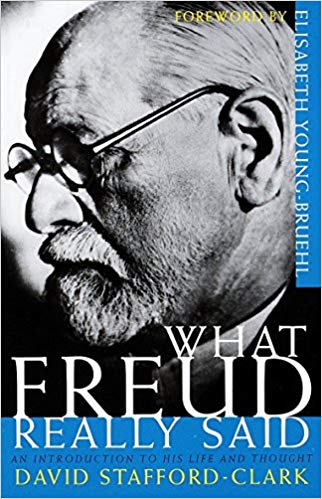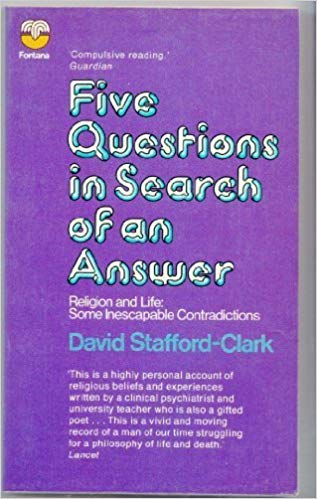Background
David Stafford-Clark was born on March 17, 1916, in Kent, United Kingdom.

Senate House, Malet St, Bloomsbury, London WC1E 7HU, United Kingdom
David Stafford-Clark studied at London University, which he graduated in 1939.

(What Freud Really Said offers the most lucid overview ava...)
What Freud Really Said offers the most lucid overview available of Sigmund Freud, his legacy, and his place in our world. As the person responsible for the birth of psychoanalysis and one of the sharpest clinical minds of the twentieth century, Freud continues to be one of the most influential thinkers of our time and one of the most controversial.
https://www.amazon.com/What-Freud-Really-Said-Introduction/dp/0805210806/?tag=2022091-20
1965

(This book is in good condition. The pages are all there, ...)
This book is in good condition. The pages are all there, firmly attached and clean. There are no writing, marking or underlining visible. The binding is solid and tight. The front and back covers are good as well. The dust cover is good also. There is a tape mark on the spine which was used for library ID purposes.
https://www.amazon.com/gp/product/0171230183/?tag=2022091-20
1970
David Stafford-Clark was born on March 17, 1916, in Kent, United Kingdom.
David Stafford-Clark was educated at Felsted and Institute of Psychiatry, the University of London (now part of King's College London).
Following the completion of his medical studies at London University in 1939 he served as a member of the house staff at the university until the beginning of the Second World War during which he served in the RAF and published two volumes of war poetry. In 1941, he published his first book, a volume of poetry entitled Autumn Shadow, which was followed by Sounds in the Sky in 1944.
His time in charge of the station hospital at Bomber Command in Cambridgeshire proved influential to his later life as it enabled him to gain enough experience of psychiatry that he chose to specialize in the discipline at the close of the war. He trained at the Institute of Psychiatry, and at the Maudsley under Sir Aubrey Lewis. He also spent a year in the United States on a Nuffield Fellowship.
In 1950, he took up a post at Guy’s Hospital. In 1954, he was appointed Head of the department of psychological medicine and director of the York Clinic, posts he held until his retirement.
His public career was widely varied. He appeared on the Lifeline series of television programmes during the 1960s and gave expert testimony in several high-profile court cases including the case surrounding D. H. Lawrence’s Lady Chatterly’s Lover. In addition to ‘Myth, Magic and Denial’ the 1977 - 78 Gifford lectures at the University of St Andrews he delivered the 1960 Robert Waley Cohen lectures entitled ‘Psychology of Prejudice: Christians and Jews’.
In 1952, he wrote his first book dedicated to his craft, Psychiatry Today, and subsequently published several others, including Mental Health for Red Cross Workers in 1958, What Freud Really Said in 1965, and his Soldier without a Rifle, a novel published in 1976. Due to health difficulties, he retired early in 1973 and died on 9 September 1999.
David Stafford-Clark changed the face of psychiatry in Britain during the post-war era. When he began as a psychiatrist, mental patients were still incarcerated in asylums, separated from the physically ill both in their treatment and in the way they were regarded by the public. Psychiatrists were sneered at as "trick cyclists" by other members of the medical profession. By the time he retired in 1973, mental and emotional illness had taken its rightful place in the mainstream of modern medicine.
Stafford-Clark earned several artistic awards in his career, notably the Silver Medal of Royal Society of Arts in 1959, and the Gate Prize for Poetry.
(What Freud Really Said offers the most lucid overview ava...)
1965(This book is in good condition. The pages are all there, ...)
1970Physical Characteristics: Stafford-Clark's wartime service included participation in the Porton Down experiments into the effects of poison gas which left him with permanent lung damage.
In 1941, David married Dorothy Stewart. He had a son, Max Stafford-Clark.

Born on 17 March 1941.
Maxwell Robert Guthrie Stewart "Max" Stafford-Clark is an English theatre director.

8 November 1900 – 21 January 1975
Sir Aubrey Julian Lewis was the first Professor of Psychiatry at the Institute of Psychiatry, London (now part of King's College London), and is credited with being a driving force behind the flowering of British psychiatry after World War II as well as raising the profile of the profession worldwide.
